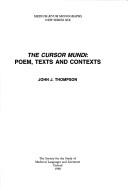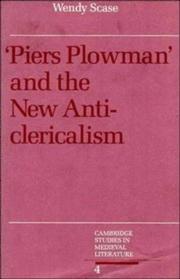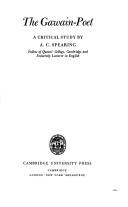| Listing 1 - 9 of 9 |
Sort by
|
Book
ISBN: 0416122906 9780416122909 Year: 1969 Publisher: London: Methuen,
Abstract | Keywords | Export | Availability | Bookmark
 Loading...
Loading...Choose an application
- Reference Manager
- EndNote
- RefWorks (Direct export to RefWorks)
Book
ISBN: 9780199680993 019968099X Year: 2013 Volume: 342 Publisher: Oxford Oxford University Press
Abstract | Keywords | Export | Availability | Bookmark
 Loading...
Loading...Choose an application
- Reference Manager
- EndNote
- RefWorks (Direct export to RefWorks)
"This mid fourteenth-century poem, a discussion of the 'contempt of the world' and the 'Four Last Things', was one of the most popular Middle English texts in its time, as indicated by the large number of extant copies, and illustrations of it in the windows of All Saints, North Street, in York. It was a widely influential compendium of religious instruction, originating in Yorkshire, but more widely disseminated, and thus representing this important regional culture, as well as its absorption into a nationwide religious culture. The only edition, by Richard Morris (1863), is now generally unavailable outside research libraries. The present edition revises Morris's text extensively and offers full modern annotation, including extensive discussion of the poem's sources. Morris's text, although based on an exceptionally good manuscript copy, has been fully collated with the principal early manuscripts; this information is presented in a separate textual commentary. There is an introduction presenting the poem in its context and a Glossary."--Publisher's website.

ISBN: 0198117620 Year: 1990 Publisher: Oxford Clarendon Press
Abstract | Keywords | Export | Availability | Bookmark
 Loading...
Loading...Choose an application
- Reference Manager
- EndNote
- RefWorks (Direct export to RefWorks)
Knights and knighthood in literature --- Repentance in literature --- Sin in literature --- Romances, English - History and criticism. --- Christian poetry, English (Middle) - History and criticism. --- Knights and knighthood in literature. --- Repentance in literature. --- Penance in literature. --- Sin in literature.

ISBN: 0907570127 9780907570127 Year: 1998 Volume: 19 Publisher: Oxford The society for the study of medieval languages and literature
Abstract | Keywords | Export | Availability | Bookmark
 Loading...
Loading...Choose an application
- Reference Manager
- EndNote
- RefWorks (Direct export to RefWorks)
Christian poetry, English (Middle) --- History and criticism. --- Criticism, Textual. --- Sources. --- Cursor mundi. --- Bible --- In literature. --- -Christian poetry, English (Middle) --- -Christian poetry, English --- Christian poetry, Middle English --- English Christian poetry, Middle --- Middle English Christian poetry --- English poetry --- Criticism, Textual --- History and criticism --- Sources --- -Criticism, Textual --- Christian poetry, English --- Biblia --- Christian poetry, English (Middle) - History and criticism. --- Christian poetry, English (Middle) - Criticism, Textual. --- Christian poetry, English (Middle) - Sources.
Book
ISBN: 0300015453 9780300015454 Year: 1972 Volume: 178 Publisher: New Haven, CT ; London : Yale University Press,
Abstract | Keywords | Export | Availability | Bookmark
 Loading...
Loading...Choose an application
- Reference Manager
- EndNote
- RefWorks (Direct export to RefWorks)
Christian poetry, English (Middle) --- Dreams --- Poetry --- Dreams in literature --- History and criticism --- Religious aspects --- Christianity --- History of doctrines --- Psychological aspects --- Langland, William, --- -Dreams in literature --- -Poetry --- -Poems --- Verses (Poetry) --- Literature --- Dreaming --- Subconsciousness --- Visions --- Sleep --- -Christianity --- -History of doctrines --- -Psychological aspects --- Philosophy --- Langland, William --- -History and criticism --- Dreams in literature. --- History and criticism. --- Psychological aspects. --- -Dreaming --- Poems --- Christian poetry, English (Middle) - History and criticism --- Dreams - Religious aspects - Christianity - History of doctrines - Middle Ages, 600-1500 --- Poetry - Psychological aspects --- Langland, William, - 1330?-1400? - Piers Plowman
Book
ISBN: 9782503528366 2503528368 9782503562759 2503562752 Year: 2009 Volume: 25 Publisher: Turnhout Brepols
Abstract | Keywords | Export | Availability | Bookmark
 Loading...
Loading...Choose an application
- Reference Manager
- EndNote
- RefWorks (Direct export to RefWorks)
Saints Edith and Æthelthryth: Princesses, Miracle Workers, and their Late Medieval Audience narrates the lives of two Anglo-Saxon princesses who were venerated as saints long after their deaths. St Edith, the daughter of King Edgar, was renowned as a patron of the arts and the church during her lifetime; her posthumous miracles included protection of Wilton Abbey and the English royal family. St Æthelthryth, who retained her virginity through not one but two royal marriages, also worked numerous miracles at her tomb at the Abbey of Ely. The poems, composed at Wilton Abbey in the early fifteenth century, allow us to see how late medieval religious women practised their devotion to early medieval women saints. The Middle English verse texts are presented here in the original and in translation with explanatory notes and glossary. A thorough introduction provides extensive contextualization and analysis of the two poems as well as description of the manuscript and its language and prosody. These primary source texts are important contributions to the study of English history, language, literature, religion, and women's studies.
Christian spirituality --- Edith of Wilton --- Christian women saints --- Christian poetry, English (Middle) --- Saintes chrétiennes --- Poésie chrétienne anglaise (moyen anglais) --- Poetry. --- History and criticism. --- Poésie --- Histoire et critique --- Edith, --- Aethelthryth, --- History and criticism --- Etheldreda, --- Saintes chrétiennes --- Poésie chrétienne anglaise (moyen anglais) --- Poésie --- Edith de Wilton --- Poetry --- Etheldreda --- Christian poetry [English ] (Middle) --- Christian women saints - Poetry --- Christian poetry, English (Middle) - History and criticism --- Etheldreda regina abb. Eliensis --- Editha abb. Wiltoniensis --- Edith, - Saint, - d. ca. 986 - Poetry --- Etheldreda, - Queen of Northumbria, - 630-679 - Poetry --- Edith, - Saint, - d. ca. 986 --- Etheldreda, - Queen of Northumbria, - 630-679 --- Edith (sainte) --- Poésie chrétienne --- Poésie anglaise --- 1100-1500 (moyen anglais)

ISBN: 052136017X 0521044545 0511553021 9780521360173 9780511553028 9780521044547 Year: 1989 Volume: 4 Publisher: Cambridge Cambridge University Press
Abstract | Keywords | Export | Availability | Bookmark
 Loading...
Loading...Choose an application
- Reference Manager
- EndNote
- RefWorks (Direct export to RefWorks)
The medieval English poem Piers Plowman is noted for its attacks on the clergy. The later fourteenth century, when the poem was written, is often thought of as an anticlerical age. This book is an extended investigation of the anticlericalism of the poem. Dr Scase challenges the usual assumption that long-established anticlerical traditions continued unchanged in the conflicts of this period. She describes and analyses important but little-known medieval polemics and satires (many of them only available in manuscript), tracing the emergence of a distinctive 'new anticlericalism' which entailed nothing less than the making of a new anticlerical literature. With the writing of Piers Plowman, she argues, this literary challenge was accepted. Always referring closely to the contemporary controversies, and with constant attention to the detail of the text, she reveals the significance of the poem's anticlericalism. Informative and rigorously argued, this book is intended to convince literary critics and historians alike.
Christian poetry, English (Middle) --- Church history --- Anti-clericalism --- Clergy in literature. --- History and criticism. --- History. --- 27 <420> "13" --- -Clergy in literature --- -Church history --- -Christianity --- Ecclesiastical history --- History, Church --- History, Ecclesiastical --- History --- Christianity --- Church and state --- Clergy --- Clericalism --- Kerkgeschiedenis--Engeland--?"13" --- History and criticism --- Langland, William --- England --- -27 <420> "13" --- -Kerkgeschiedenis--Engeland--?"13" --- -Christian poetry, English (Middle) --- -Anti-clericalism --- Clergy in literature --- Middle Ages, 600-1500 --- Langland, William, --- Arts and Humanities --- Literature --- Christian poetry, English (Middle) - History and criticism. --- Church history - Middle Ages, 600-1500. --- Anti-clericalism - England - History.
Book
ISBN: 0300020007 9780300020007 Year: 1976 Publisher: New Haven (Conn.): Yale university
Abstract | Keywords | Export | Availability | Bookmark
 Loading...
Loading...Choose an application
- Reference Manager
- EndNote
- RefWorks (Direct export to RefWorks)
Influence (Literary, artistic, etc) --- Christian poetry, English (Middle) --- Epic poetry, English --- History --- History and criticism --- Spenser, Edmund, --- Langland, William, --- England --- Intellectual life --- -Epic poetry, English --- -Influence (Literary, artistic, etc.) --- Self in literature --- 820 --- Artistic impact --- Artistic influence --- Impact (Literary, artistic, etc.) --- Literary impact --- Literary influence --- Literary tradition --- Tradition (Literature) --- Art --- Influence (Psychology) --- Literature --- Intermediality --- Intertextuality --- Originality in literature --- English epic poetry --- English poetry --- Engelse literatuur --- Langland, William --- -Spenser, Edmund --- Influence --- -Intellectual life --- -Christian poetry, English (Middle) --- 820 Engelse literatuur --- Self in literature. --- History and criticism. --- Influence. --- Influence (Literary, artistic, etc.) --- Angleterre --- Anglii︠a︡ --- Inghilterra --- Engeland --- Inglaterra --- Anglija --- Langland, Robert, --- Langland, Uĭli︠a︡m, --- 820 English literature. Literature in English --- English literature. Literature in English --- Influence (Literary, artistic, etc.) - History - 16th century --- Christian poetry, English (Middle) - History and criticism --- Epic poetry, English - History and criticism --- Spenser, Edmund, - 1552?-1599? - Faerie queene --- Langland, William, - 1330?-1400? - Piers Plowman --- England - Intellectual life - 16th century --- England - Intellectual life - 1066-1485

ISBN: 0521078512 0521291194 9780521078511 9780521291194 Year: 1970 Publisher: Cambridge ; New York, NY : Cambridge University Press,
Abstract | Keywords | Export | Availability | Bookmark
 Loading...
Loading...Choose an application
- Reference Manager
- EndNote
- RefWorks (Direct export to RefWorks)
Manuscripts, English (Middle) --- -Christian poetry, English (Middle) --- English poetry --- -Knights and knighthood in literature --- Littérature anglaise --- --Moyen âge, --- History and criticism --- Gawain and the Grene Knight --- Christian poetry, English (Middle) --- English manuscripts (Middle) --- Manuscripts, Middle English --- Middle English manuscripts --- Gawain and the Grene Knight. --- Pearl (Middle English poem) --- Patience (Middle English poem) --- Purity (Middle English poem) --- Pearl (Middle English poem). --- Patience (Middle English poem). --- Purity (Middle English poem). --- -English poetry --- -Arthurian romances --- -English manuscripts (Middle) --- Arthurian romances --- Knights and knighthood in literature --- Sir Gawain and the Green Knight. --- Sir Gawain and the Grene Knight --- Sir Gawayne and the Grene Knight --- Gawayne and the Grene Knight --- Cleanness (Middle English poem) --- Knights and knighthood in literature. --- History and criticism. --- Manuscripts, English (Middle) - - West Midlands - England --- -Christian poetry, English (Middle) - History and criticism --- English poetry - - History and criticism - Middle English, 1100-1500 --- Moyen âge, 476-1492
| Listing 1 - 9 of 9 |
Sort by
|

 Search
Search Feedback
Feedback About UniCat
About UniCat  Help
Help News
News